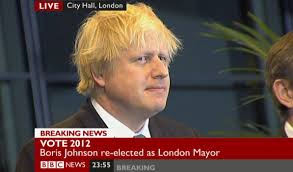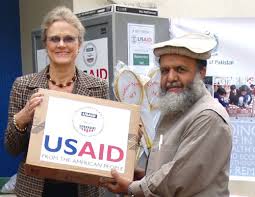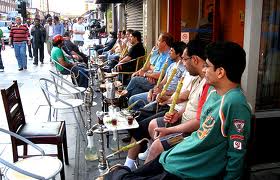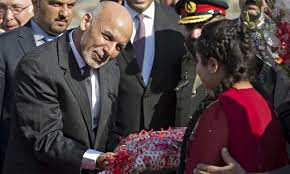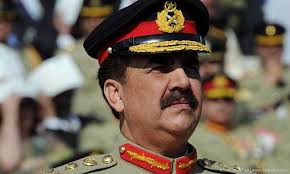GULAN CAMP, Afghanistan (Nov 15) — Through three decades of war, waves of Afghans have fled their homes along the eastern border areas, many of them seeking shelter in the Pakistani tribal regions next door.
Last summer another wave of refugees surged through the area. But in a reversal, it is Pakistanis, not Afghans, who are fleeing war at home.
“There was fighting everywhere,” said Sadamullah, a laborer who fled with his family last month from Dattakhel, a district in Pakistan’s tribal areas. “There was shelling, and military forces were firing mortars on our villages. They carried out an operation in our area, and a woman was killed by them.”
Mr. Sadamullah, who like many tribesmen here has only one name, was speaking about the Pakistani military’s continuing offensive against Islamist militants in the North Waziristan region. The military has been clearing territory in the region since June, forcing an exodus of at least 1.5 million residents. As many as 250,000 of them have since crossed the border into Afghanistan, officials say.
The tribal communities on both sides of the border are Pashtun, and many of the refugees from the Pakistani side have found shelter with relatives or sympathetic families on the Afghan side, mostly in Khost and Paktika Provinces. In some cases, refugees have been able to rent or borrow a patch of land or a walled compound for their families and some livestock.
But the poorest — about 3,000 families, according to the United Nations refugee agency — are perched in Gulan Camp, a stretch of rough stones and reed bushes in the Gorbuz district of Khost, just a few miles from the border.
Canvas tents spread out toward the brown crags of the horizon. Women are cloistered behind flimsy screens, and children, who make up 65 percent of the camp population, dart in and out under the canvas flaps. The men have started building mud walls around the tents in an attempt to give better protection against the coming winter.
Most families came on foot, and often fled in haste with few belongings. Many tell the same story: a public warning by the Pakistani Army giving them three days to leave their homes, desperate negotiations as elders tried to win permission for civilians to stay, and then the terror of the artillery and aerial bombardments of their villages.
Continue reading the main story
“We left everything — hens, ducks, carpets,” said a widow, Shakila Saidgi, who fled her village in June. “We slept on the way in the mountains.”
She said that Pakistani forces began bombarding her village in Waziristan at four in the morning, striking the mosque where the men were gathered for dawn prayer. Her nephew was among the wounded. “When the sun rose, we left,” she said.
Refugees arriving in recent days said the five-month-old operation was continuing and even expanding. They told of Pakistani jets bombing villages and the army firing artillery barrages.
“The fighting was between the Taliban and the government, but our villages were bombarded and that’s why the people got fed up and left the area,” said Musa Kalim Wazir, a shepherd from Tank village in Dattakhel district. People did not dare to return to their homes, because whenever the army came under attack by insurgents it responded by bombarding nearby villages, he said.
Continue reading the main story Continue reading the main story
Continue reading the main story
Afghan officials, still grappling with a host of problems of their own, not least a continuing insurgency and thousands of internally displaced, now face an added burden of a quarter of a million refugees from Pakistan whose presence is turning into a long-term prospect.
“Winter is already here and all of the refugees are facing a shortage of assistance,” said Muhammad Akbar Zadran, the governor of Gurbaz district. “A group of refugees came to my office, and they told me that different diseases were spreading among their children. If they don’t get urgent treatment then it is possible that in coming days we will witness a precarious situation.”
He said: “All of the refugees have many problems; they have come here with just the clothes on their backs, and they left everything behind. If the government and people don’t respond to their needs then it will be a great problem.”
Afghanistan’s latest trial comes amid growing refugee crises around the world and a global shortage of humanitarian funding. The United Nations appealed for $25 million to assist the Pakistani refugees through the end of the year, but assistance organizations have gathered only about $10 million, said Bo Schack, representative in Afghanistan for the United Nations High Commissioner for Refugees.
“There are so many other humanitarian priorities, and having refugees inside Afghanistan arriving from another country was not what anybody really expected,” he said in a telephone interview. “But this time we are seeing very significant numbers crossing the border in one go.”
“It may end up being another protracted kind of situation which clearly everybody would like to avoid,” he added.
For many of the refugees, Afghanistan represents a relief not only from bombardment but from the draconian rule of the Pakistani Taliban and foreign Islamist fighters. In North Waziristan, the militant groups had largely forced out any civilian or tribal leadership, in a brutal reign that left much of the local population alienated and frightened.
“If you did not help the Taliban or the foreigners, you were killed,” said Mushtaq, a refugee who goes by only one name.
Another refugee, who did not want his name used because he was afraid of reprisal, described years of hell as the militants took firmer hold in North Waziristan.
“They started harassing people a lot, and people became disenchanted,” he said. “Then they started killing people and accusing them of spying for the government. They were trying to terrify the people. They used to wear masks on their faces and they would drag out anyone they wanted and take him to their base.” The fear led some to join the militants for protection. “They created an environment so they could easily attract people,” the refugee said. “If someone joined them they would become powerful. Some of my relatives joined them.”
In that environment, much of the population supported the idea of a military offensive. Yet few said they trusted the Pakistani military, and their fears were borne out when they saw the militants escape ahead of the offensive and the bombardment. “The operation itself is right, but the way they conduct it is wrong, and it is harming me more than the fighters,” Umar Khan, a tribal elder who has represented refugees in meetings with Afghan officials, said in July. “It damaged my house, my village and my land. And I lost everything.”
By the end of October, he said he did not believe government figures of hundreds of Taliban killed. But he warned that the military was still killing civilians in the operation. “Waziristan has been completely destroyed by the military forces,” he said.
Afghans have long accused Pakistan of sheltering militants seeking to kill government and international forces in Afghanistan. Now, the concern is that some of those militants are still able to operate, and will seek to infiltrate the refugees.
Refugees have complained since the start that many militants escaped ahead of them and officials say some have settled on the Afghan side of the border. The issue has been a point of tension between the Afghan and Pakistani governments. “If our government and the international community don’t help these people on time,” Mr. Zadran warned, “then someone — in particular the Taliban — will get the chance to influence these people.”
Haris Kakar contributed reporting from Khost Province, Afghanistan.



